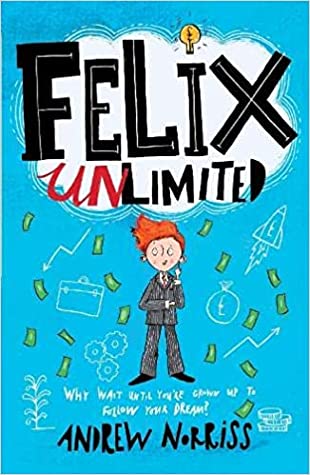Adventures with Words: Felix Unlimited by Andrew Norriss

Felix Unlimited by Andrew Norriss
Quietly, without any fuss, and entirely unnoticed by the literary establishment, Andrew Norriss has become the best writer for children today. Not entirely coincidentally, this also explains in large part why he has become such a great writer. ‘Quietly’ because this is not the sort of writing that draws attention to itself but rather is so skillfully done that the art behind and supporting it disappears entirely. ‘Without any fuss’ because the characters who people Andrew Norriss’s books are exactly the sort of people who do live their lives ‘without any fuss’, not calling attention to themselves but getting on with living in the way that the English were once celebrated for and that still continues, away from the distorting glare of anything to do with the media. Andrew Norriss writes the Drama of the Good, of people who are attempting, each by their own light, to do the best for themselves and their families and friends. It is how most people, away from the corruption of politics or media, generally live and Norriss makes these people the heroes of his stories. The more sceptical reader might ask, where then is the conflict, the tension to provide the petrol for the narrative engine? It is there in life itself, in its pitfalls, straitenings, misadventures and all the limitations and constraints that attend upon being a particular person living in particular circumstances in a particular time and place. To exist at all is to be filtered from limitless possibility and to be inserted into time and place. This is the drama of existence in its purest form, freed from the crabbing effects of the storybook villain with all his fake freedom: it is the story of the conflict with being itself, sometimes in its most recalcitrant forms and sometimes with its most generous face on – and usually in the same Andrew Norriss story!
As for being ‘entirely unnoticed by the literary establishment’, that is a result of the stories having nothing to do with the sort of fashionable tropes and passing political fads that form opinions and tastes among this self-selected and self-satisfied coterie. Most of the literature that supports this establishment is reflective, mirroring back its own attitudes on itself to its own self-aggrandisement – there is nothing better calculated to increase one’s own vanity than to have one’s beliefs fed back in a slightly offset manner. But Andrew Norriss is doing something that Rudyard Kipling did in the 19th century: he is writing about the sorts of people who would normally never feature in proper literature. Kipling wrote of the everyday soldiers of the Empire, he wrote of fishermen on the Grand Banks and engineers on the Indian Railways, of an orphaned Indian boy and a fierce little mongoose, he wrote of men who made things and drove things and did things, very far from the literary salons of the century. Andrew Norriss writes about children who are kind and considerate, and in Felix Unlimited he writes of a boy who wants to run a business. Entrepeneuers, even junior entrepeneurs, are not the sort of people that writers meet very often and even less so do they feature in the academic circles of the literary elite. But when the history of the 21st century comes to be written I strongly suspect that Elon Musk will be written about long after Philip Pullman has been forgotten. Andrew Norriss writes about a boy who likes starting businesses, who keeps trying even when things go wrong, and how they go write. Even the boy’s uncle, a very successful businessman who in any other story would be a conniving capitalist ready to defraud his nephew, in this story proves honourable and helpful. Anyone thinking of starting a business could put aside the start-up manuals, with all their dreadful management speak, and just read this book instead. It’s all there, everything necessary to start and get a business going, within the context of the most delightful story. Felix Unlimited indeed!
0 Comments